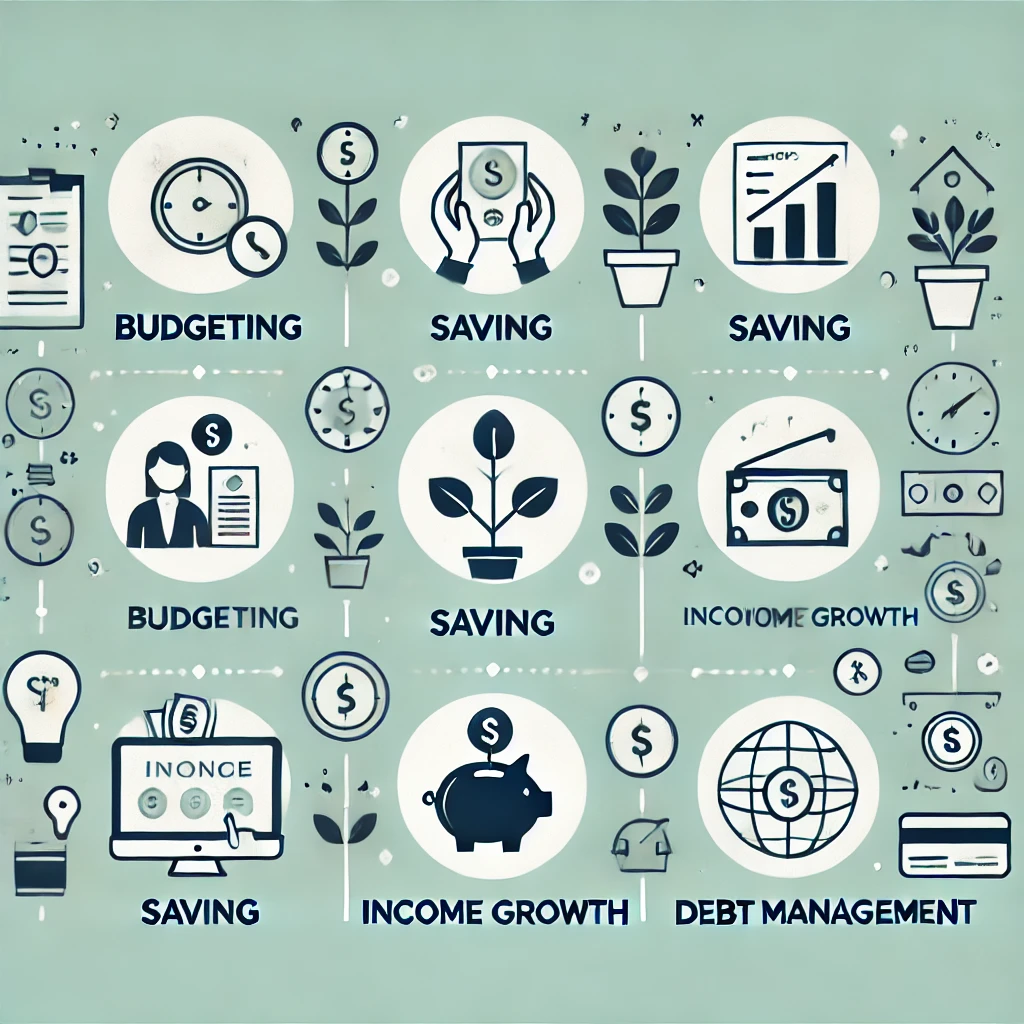Mastering Financial Wellness: Steps to Boost Income and Manage Expenses
 Personal finance is a journey, not a destination. After laying the groundwork with budgeting and saving, taking your financial strategy to the next level can help you achieve long-term financial wellness. In this article, we’ll explore practical strategies for boosting your income, managing expenses efficiently, and building the discipline needed to maintain financial health for years to come. Whether you're a beginner or a seasoned planner, these steps can reinforce your approach to personal finance.
Personal finance is a journey, not a destination. After laying the groundwork with budgeting and saving, taking your financial strategy to the next level can help you achieve long-term financial wellness. In this article, we’ll explore practical strategies for boosting your income, managing expenses efficiently, and building the discipline needed to maintain financial health for years to come. Whether you're a beginner or a seasoned planner, these steps can reinforce your approach to personal finance.
1. Diversifying and Growing Your Income Streams
Relying solely on a single income source can be risky in today’s economy. One of the most effective ways to enhance financial stability is by creating multiple income streams. This doesn’t mean working multiple full-time jobs but rather finding additional ways to earn money that fit into your lifestyle.
Exploring Side Hustles
Side hustles allow you to generate additional income without a full-time commitment. Examples include freelance work, online tutoring, writing, graphic design, or even selling handmade goods on platforms like Etsy. The key to a successful side hustle is choosing something that aligns with your skills and interests, so it feels less like extra work and more like a productive hobby.
Investing in Passive Income Opportunities
Passive income requires an initial investment of time, money, or effort but continues to generate returns with minimal upkeep. Some examples include:
- Dividend Stocks: Invest in dividend-yielding stocks to earn a steady income from your investments.
- Rental Properties: Real estate can provide regular rental income, although it requires upfront investment and ongoing management.
- Digital Products: Consider creating online courses, e-books, or templates. Once made, digital products can be sold indefinitely with little maintenance.
Advancing Your Career
Your primary income source often has potential for growth through skill development, training, and networking. Consider negotiating for raises, pursuing certifications, or attending industry events to build valuable connections. The higher your expertise and value, the more opportunities you’ll have for income growth.
2. Mastering Expense Management for Greater Savings
Understanding and managing expenses is essential for financial health. Even with a solid income, unmanaged spending can lead to financial instability. Let’s break down some techniques for managing expenses wisely.
Categorizing Expenses
Divide your expenses into three categories:
- Fixed Expenses: These are regular, predictable expenses like rent, utilities, and loan payments.
- Variable Expenses: These fluctuate monthly, such as groceries, gas, or dining out.
- Discretionary Spending: These are non-essential expenses, such as entertainment, vacations, or hobbies.
By separating your expenses, you can pinpoint areas where you may be overspending and identify potential savings.
Practicing the 24-Hour Rule
Impulse purchases can quickly add up. A simple yet effective strategy is to wait 24 hours before making any non-essential purchase. This gives you time to assess if it’s a necessary expense or a fleeting desire. In most cases, people find that they no longer want the item after some reflection.
Using Cash-Only for Discretionary Spending
Using cash for discretionary spending can be a powerful way to control expenses. By setting aside a specific amount of cash each month, you limit your spending to what you have on hand. When the cash is gone, you know you’ve hit your limit, which helps prevent overspending.
Reviewing and Adjusting Subscriptions
Subscription services are easy to accumulate, and even small monthly fees add up over time. Regularly review your subscriptions (like streaming services, gym memberships, or apps) and cancel any you no longer use or value. Many people find they’re paying for services they’ve forgotten about, which frees up cash once eliminated.
3. Prioritizing and Managing Debt Wisely
Debt can be a tool or a trap, depending on how it’s managed. Here are strategies for staying on top of debt and reducing its impact on your financial health.
Assessing Debt Types
Not all debt is bad. "Good debt" includes loans that provide a long-term benefit, such as a mortgage or student loans. "Bad debt" often includes high-interest consumer loans like credit card balances. Focus on eliminating high-interest debt first to avoid paying more over time.
Creating a Debt Payment Plan
Two effective methods for tackling debt are the Snowball and Avalanche methods:
- Snowball Method: Pay off your smallest debt first, regardless of interest rates, to build momentum and gain confidence.
- Avalanche Method: Prioritize paying off the debt with the highest interest rate to save the most money over time.
Avoiding Lifestyle Inflation
Lifestyle inflation happens when increased income leads to increased spending. To prevent lifestyle inflation, keep your expenses stable and direct extra income toward debt payments or savings. This discipline can accelerate your financial goals and reduce debt faster.
4. Building and Maintaining Financial Discipline
Financial discipline is what keeps good financial habits sustainable. With discipline, you can make smart decisions that align with your goals even when it’s tempting to stray.
Setting Clear Financial Goals
Establishing clear, achievable goals keeps you focused and provides motivation. Break down large goals (like paying off $10,000 in debt) into smaller milestones (such as paying off $1,000 every quarter). Celebrating these milestones keeps you motivated and gives you a sense of progress.
Embracing a Minimalist Mindset
A minimalist mindset encourages you to live with only what you truly need, reducing clutter in your finances and in your life. Focus on quality over quantity when making purchases, and avoid unnecessary spending on items that don’t add long-term value.
Tracking Your Progress Regularly
Regularly tracking your financial progress is essential for staying disciplined. Set aside time each month to review your budget, expenses, and goals. Adjust as needed, and recognize any successes to keep your motivation high.
5. Automating Finances for Effortless Management
Automation removes the manual work involved in saving, investing, and paying bills. This hands-off approach can help you achieve your goals with minimal effort.
Automating Savings
Set up automatic transfers to your savings account each payday. This ensures a portion of your income goes directly to savings, reducing the temptation to spend it. Automated savings plans are especially effective for emergency funds and short-term savings goals.
Automating Investments
Many investment platforms offer automatic investment plans. By setting up recurring investments, you’ll contribute regularly to your portfolio without needing to remember to make transfers manually. Over time, these consistent contributions can build substantial wealth.
Automating Bills
Automate your bills to avoid late fees and keep your credit score healthy. Many banks and service providers offer automatic bill pay options, ensuring that you’re always up to date on payments.
6. Planning for Future Financial Goals
Whether it’s retirement, buying a home, or planning for education, setting specific financial goals helps you prioritize and save toward meaningful milestones.
Saving for Retirement
Retirement savings are critical for a secure future, and starting early allows you to maximize compound interest. Take advantage of employer-sponsored retirement plans, such as a 401(k), especially if your employer offers matching contributions. Consider also opening an IRA for additional tax-advantaged savings.
Saving for Major Purchases
Big-ticket items like a home, car, or education require planning. Break down the amount needed and create a savings schedule that allows you to reach your goal without jeopardizing other financial priorities.
Creating an Estate Plan
An estate plan is essential to protect your assets and ensure your wishes are honored. This includes creating a will, designating beneficiaries, and possibly setting up a trust. Even if you’re young, having an estate plan in place provides peace of mind for you and your loved ones.
7. Staying Adaptable and Continuing Financial Education
Personal finance is a dynamic field that requires flexibility and a commitment to lifelong learning. As your financial situation and goals evolve, it’s essential to stay informed and adjust your strategies accordingly.
Staying Up-to-Date with Financial Trends
Financial laws, tax codes, and investment strategies change over time. Staying informed on these topics can help you make smarter decisions and take advantage of new opportunities. Consider following personal finance blogs, reading financial news, or attending workshops to keep your knowledge current.
Seeking Advice When Needed
If you encounter complex financial decisions or find yourself struggling to reach your goals, consulting a financial advisor can provide clarity. Many certified financial planners (CFPs) offer services tailored to your situation and goals.
Practicing Financial Self-Care
Financial self-care involves understanding your relationship with money and ensuring it aligns with your values and goals. Reflect on your spending habits, emotions around money, and financial goals regularly to maintain a positive relationship with your finances.
Achieving financial wellness is an ongoing journey that requires consistent effort, adaptability, and strategic planning. By diversifying your income, managing expenses, and staying disciplined, you can navigate the challenges and opportunities that come with personal finance. Remember, building wealth and financial security is not about quick fixes but about cultivating habits that lead to lasting success. Each step you take brings you closer to a stable and prosperous financial future. Embrace the journey, keep learning, and stay committed to your goals.
